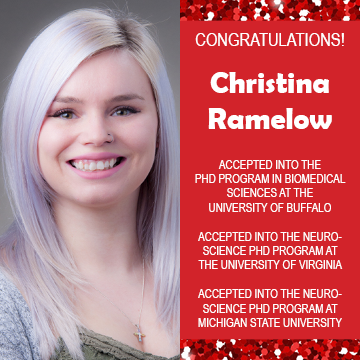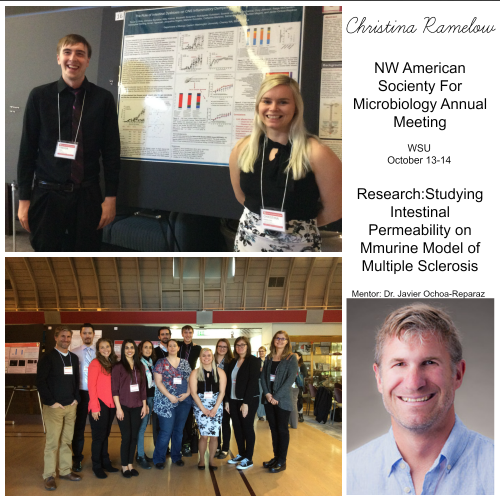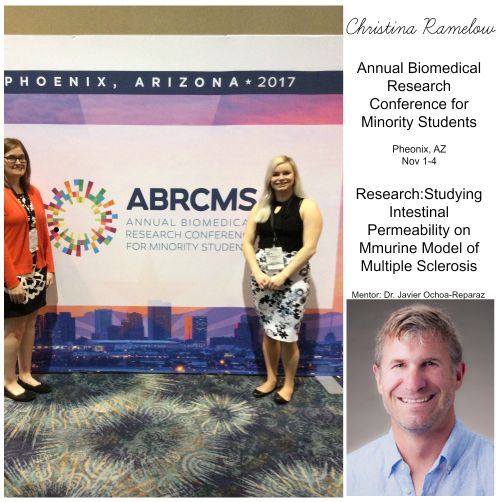Christina Ramelow
Christina Ramelow graduated from Eastern Washington University. She discovered her passion for biomedical research during her first research experience under Dr. Herr in spring 2016. Fascinated by cell biology, she used cell culture to study how a fungus, Pseudoloma neurophilia, infects zebrafish ovarian tissue, tested two antifungals and determined one may treat the infection without damaging host cells.
In fall 2016, her interests expanded when she began research with Dr. Ochoa-Repáraz. Their team focused on the role of the gut microbiota regulating central nervous system (CNS) inflammatory demyelination using a mouse model of multiple sclerosis. They found that the association between gut microbes and disease is reciprocal, and that disease onset modified the microbiota. In 2017, she was selected into the McNair Scholars Program. In her summer research project with McNair she investigated whether disease increased intestinal permeability, which would constitute a mechanism of inflammation in EAE.
In 2018, Christina enrolled in the EWU biotechnology program under Dr. Matos. Her team explored the effect of an anti-inflammatory supplement, serratiopeptidase, on wild-type and disease fruit flies. Using developmental and behavioral assays, they determined a potential dosage to treat inflammation. They also designed a probiotic that could constitutively release the enzyme to treat an inflammatory mouse model.
As a McNair intern under Dr. Daberkow in 2018, Christina made and coated microelectrodes with neural cell adhesion molecules (NCAMs) and tested their ability to record dopamine (DA) using voltammetry. She also performed electrode implantation surgeries into dopaminergic brain regions of anesthetized rats. We found that NCAM improved electrode function to measure DA.
After graduating, Christina continued research as a master’s student at EWU focusing on neuro-immune pathways with Dr. Ochoa-Repáraz as her mentor. Her thesis research involves identifying how the isoprenol, farnesol, is neuroprotective in an animal model of multiple sclerosis by using cellular and molecular techniques. She predicts farnesol is promoting an anti-inflammatory effect in the CNS. She presented this research at the 2020 EWU Virtual Symposium: Oral Farnesol Administration Protects Against Inflammatory Demyelination. Christina completed her MS Biology at Eastern Washington University in 2020.
She is particularly interested in understanding neuro-immune and neuroinflammatory processes, elucidating the cellular and molecular pathways that govern disease, and designing novel treatments for neuropathologies. She plans to continue her education at the doctoral level, and was accepted with full funding into Biomedical Science PhD programs at Oregon Health and Science University and the University at Buffalo; the Interdisciplinary PhD program at Vanderbilt; the Cellular and Molecular Biology PhD Program, as well as the Cellular and Molecular Pathology Programs at the University of Wisconsin, Madison; the Moledular Biosciences Program at Montana State; the Biomolecular Sciences Gateway PhD Program at Michigan State University; and Neuroscience PhD programs at the University of Virginia, Michigan State University, and Emory University, where she began attending in the Fall of 2020.
2018 McNair Faculty Research Mentor: Dr. David Daberkow – Biology
Research Title: Improving dopamine electrode sensitivity with L1CAM
2017 McNair Faculty Research Mentor: Dr. Javier Ochoa-Reparaz – Biology
Research Title: Studying Intestinal Permeability on Murine Model of Multiple Sclerosis
Abstract: The study investigates the association between intestinal permeability and severity of decease. Non-obese diabetic (NOD) mice develop spontaneous diabetes unless active experimental autoimmune encephalomyelitis (EAE), a murine model of multiple sclerosis, (MS) is induced.
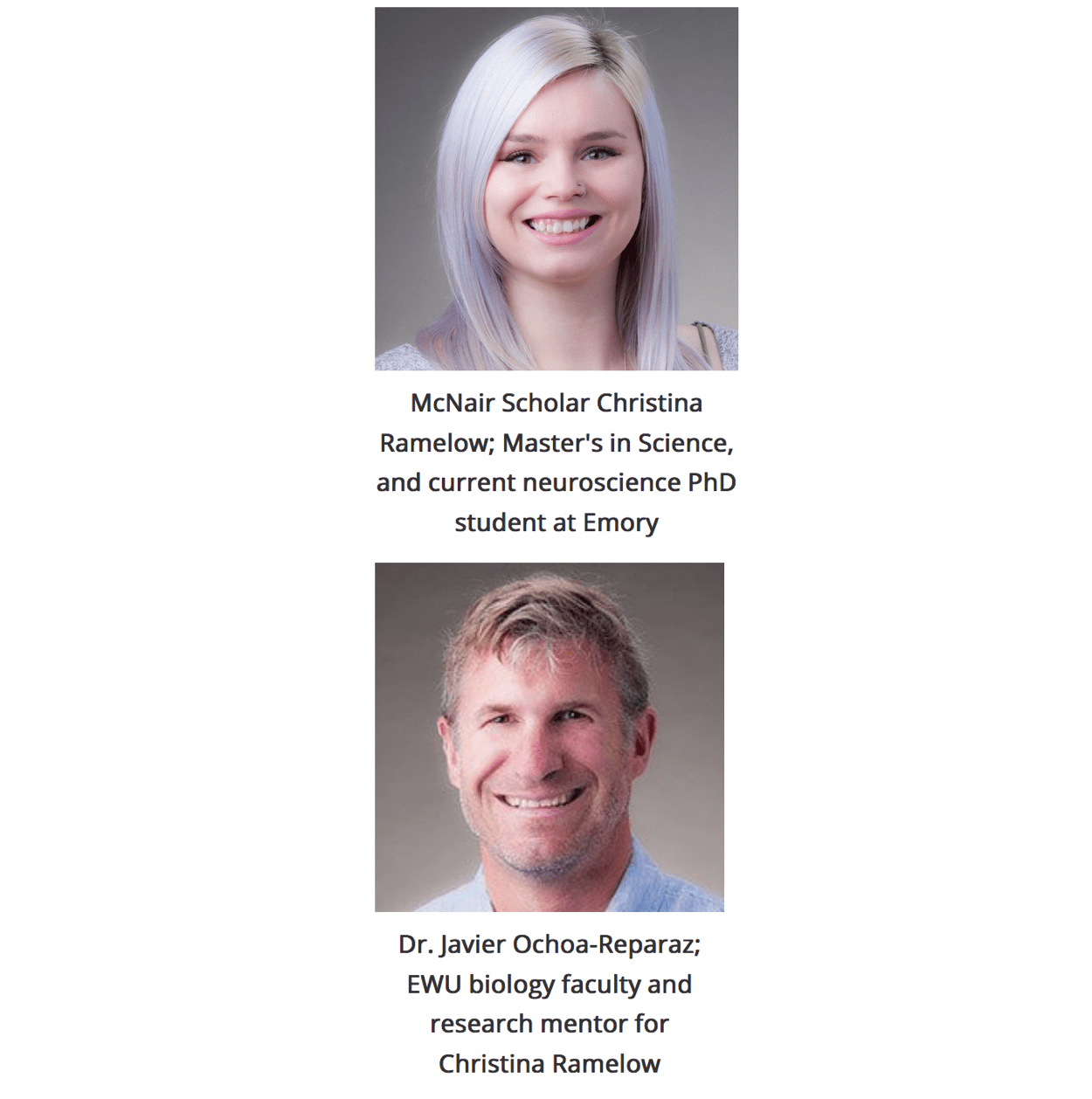
Christina Ramelow — EWU McNair alum, recent EWU Biology Master’s graduate and current neuroscience PhD student at Emory — publishes research with Dr. Javier Ochoa in Frontiers in Immunology

Christina Ramelow, MS, Eastern McNair alum, and first year neuroscience PhD student in Emory University, teaches Summer 2020 Zoom Seminars for McNair Research Interns
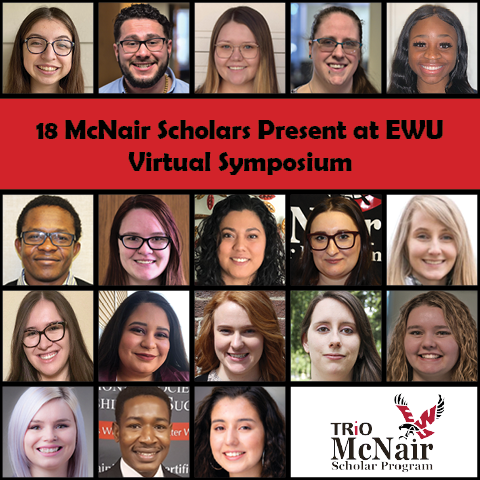
18 EWU McNair Scholars Present at EWU Virtual Symposium
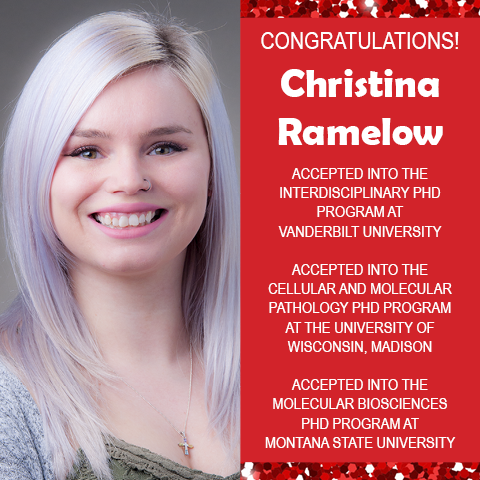
EWU McNair Alumna Christina Ramelow Accepted into 3 Additional PhD Programs
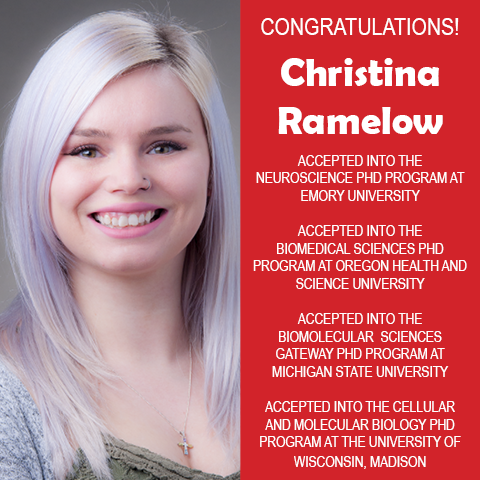
EWU McNair Alumna Christina Ramelow Accepted into 4 Additional PhD Programs
